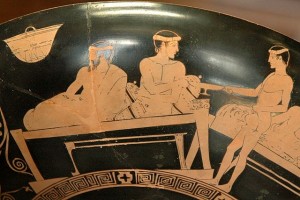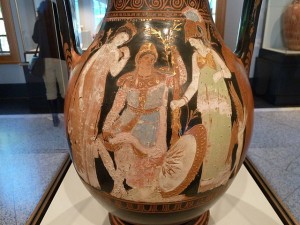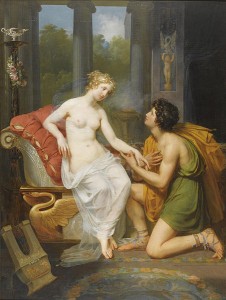The night before her marriage to Menelaus, Helen joined other young girls to dance and sing on the last night of her youth. In the morning, Helen joined in the preparations for her new adult life.


Within the immense palace complex, a massive banquet is being prepared. Accounts of entertainments in Mycenae reveal enormous events with an equally large support staff. Menus included lentil broths flavored with cumin, celery, and coriander; chickpea pancakes; grilled meats; stews; roast boar, hare, duck, and venison.
Guests participated in providing provisions, each proving his status by putting on a more elaborate feast than the one before. A poor man might bring a single goat – a rich one contributed a cow, 2 bulls, 12 pigs, one fattened pig, 1 ewe, 15 rams, 13 male goats, 8 yearlings, 375 liters of wine and over 1,000 liters of olives.*
Entertainment was a cacophony of sounds: torch lit dancing, music played on lyres and flutes, cymbals, rattles, whistles made from hippopotamus teeth. In the moments of relative silence, bards and poets regaled the guests with heroic tales of gods and men. Revelry went on for days with athletic contests and gambling.

Alas the path of love and politics is less than smooth. While Helen grew to a marriageable age, a young herdsman came to Zeus’ attention. Paris was the youngest son of Priam, King of Troy, and his wife Hecuba. Paris didn’t receive the welcome one might expect for a royal baby. Two prophecies insisted this boy would cause the downfall of Troy and must be killed. Hecuba disagreed. Priam quietly told his head herdsman to take the newborn and do the deed.
The shepherd exposed infant Paris on Mount Ida, expecting him to die of hunger and exposure. But when the shepherd returned a week later, the child still lived. So the shepherd took him home. As Paris grew, it was clear he wasn’t the average shepherd boy. He was beautiful, strong, and bright. His exploits brought him to Zeus’ attention, because it’s always useful to keep a clever mortal on file.
As luck would have it, Aphrodite, Goddess of Love; Hera, Goddess of Marriage, and Athena, Goddess of Wisdom asked Zeus to decide who should have the golden apple inscribed “For the Fairest.” Zeus demurred and gave the task to Paris. Poor lad. Three voluptuous goddesses demanded he choose. He saw them with and without their clothing. He vacillated. So the goddesses offered bribes.
Hera offered the entire known world.
Athena offered battle skills and wisdom.
Aphrodite offered the love of the most beautiful woman in the world:
Helen of Sparta.
Guess who got the apple?

Paris made his way to Troy, gained King Priam’s recognition, and was appointed to lead a fleet to Sparta where he would visit King Menelaus, among other activities. Unaware that Paris was after his wife, Menelaus put on nine days of entertainments. Paris openly flirted. He wrote, “I love you, Helen” in red wine on the tabletop. He picked up Helen’s goblet and drank from the lip where her lips had been. He played the lyre. He flaunted his beauty. All in good fun, of course.
And then, Menelaus had to go to Crete to perform rituals for his deceased grandfather. He left Helen in charge of further entertainments for Paris.

The first evening after Menelaus left, Paris came to Helen’s chamber. Aphrodite intervened. Paris and Helen gave in to their desires and eloped, but not in secret. Helen took her son, Pleisthenes, most of the palace treasure, three talents of gold stolen from Apollo’s temple, and five serving women. Helen left her nine-year-old daughter Hermione in Mycenae – perhaps because the child was her father’s heir. Paris no doubt took his entourage. So, it’s not as if the couple stole away in the dead of night with none the wiser. It was, however, several hours before Hermione realized her mother’s absence and gave the alarm.
Meanwhile, Paris and Helen escaped to a small island called Kranai where the fleet took on supplies and Paris allegedly said to Helen,
“Let’s go to bed, and lose ourselves in love!”
It’s not like Helen could change her mind at this point. Paris possessed Helen’s body and wealth. The minute Paris presented his prizes to King Priam, the king knew war would not be far behind.
Goaded by Aphrodite, Paris insulted two kings (Agamemnon and Menelaus), disrespected the rules of hospitality, grabbed another man’s wife, and stole a substantial treasure.
Yet somehow everyone blames Helen. It was her beauty. Her lust. Her duplicity. Her sex.
I like to think Helen has risen above these unjust accusations. When we think of Paris, most of us think of France. The name Helen is another matter.
Acknowledgments:
*Data from pp 83-84, Bettany Hughes
Featured Image: Portrait Helen of Troy, 1863 by Dante Gabriel Rossetti 1828-1882. Public domain. Wikimedia Commons
Bettany Hughes. Helen of Troy. Goddess, Princess, Whore. London: Jonathan Cape. 2005.

Sandra Wagner-Wright holds the doctoral degree in history and taught women’s and global history at the University of Hawai`i. Sandra travels for her research, most recently to Salem, Massachusetts, the setting of her new Salem Stories series. She also enjoys traveling for new experiences. Recent trips include Antarctica and a river cruise on the Rhine from Amsterdam to Basel.
Sandra particularly likes writing about strong women who make a difference. She lives in Hilo, Hawai`i with her family and writes a blog relating to history, travel, and the idiosyncrasies of life.


Hi Sandra: So much love in this story. I love stories such as this one.
I appreciate so very much your writing…..history is so beautiful…..(some)
Besides, I am the sentimental type of person:) 🙂 :)….xoxoxodk
Aloha Dora — So glad you enjoyed Helen’s story. I’ll be sharing more stories from time to time.